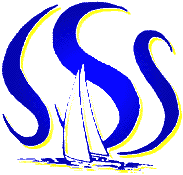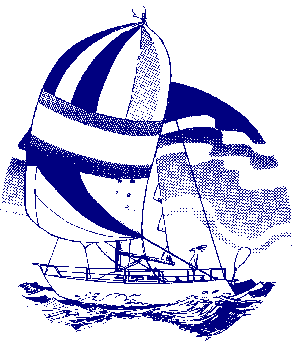
|
The Origin of the Singlehanded Sailing Society and the Singlehanded Transpac |
 |
The Singlehanded Sailing Society was conceived in the spring of 1977, the brainchild of promoter and barnstorming pilot George Sigler, owner of Survival and Safety Designs.
Sigler, a maverick ex-Navy carrier pilot, had several years previously
set out for Hawaii from San Francisco with no water and six pounds of
food in an inflatable raft to test his experimental survival kit. After
56 days he had lost 50 pounds, and was rescued by the Coast Guard 50 miles
east of Hawaii, proclaiming his voyage a success.
Sigler's fledgling business on the Oakland waterfront needed customers,
and single-handed sailors seemed a likely source of business for survival
equipment. With ambivalent press from the new waterfront monthly publication
Latitude 38, Sigler appointed himself commodore of SSS and staged the
first single-handed Farallones Race April 9, 1977.
It was a windy affair, with white cap conditions outside the Gate building
from 20 to 35 knots. Bill Lee on the new 67 foot ultra-light MERLIN left
the dock with a double-reef main and storm jib, and was first to finish
at 7:05 pm. A trimaran flipped, the Mull 41 footer SUNSHINE began to sink,
and only 15 out of 53 starters made it out to the Farallones and back
to the finish line down the Oakland Estuary, off Sigler's shop.
The Coast Guard had a busy afternoon. Unbelievably, the 8' El Toro KATIDID
had set out as an entrant in this first Farallones Race. But Katherine
La Fata abandoned her attempt before even getting outside the Golden Gate.
What was she thinking?
Last to finish, but division winner after more than 20 hours on the course
was “Max Ebb” (Paul Kamen) onboard his Santana 22 MAMBO. Overall
winner was the Wylie 27 WILDFLOWER sailed by Skip Allan. Having beat out
to the SE Farallone under double-reefed main and working staysail, WILDFLOWER
finished at 10:53, just ahead of fellow competitor Norton Smith on the
Ericson 41 EOS. Sigler had a beautiful bronze sextant as the winning trophy,
but this disappeared when Sigler's closed his shop two years later.
The “success” of this first singlehanded race prompted Sigler
to announce a singlehanded race to Hawaii (SHTP) to be held in June of
1978. Pacific Skipper Magazine was enlisted as a sponsor, and Club Med
at Hanalei Bay promised a finish welcome. Entry fee was set at $200, and
by May of that year there were 31 paid up entrants.
The size range of boats in the first SHTP ranged from the Columbia 57
MAGIC to the Santana 22 ABLE SUGAR. Two starts were scheduled: boats under
30 feet were to start June 15th, and boats over 30 feet on June 19th.
Safety rules were minimal: liferafts were not required, nor were radios.
Navigation would be primarily celestial as LORAN became unreliable about
the halfway point.
Early favorites in this first SHTP were Smith on the Santa Cruz 27 SOLITAIRE,
Allan on WILDFLOWER, Alan Rutherford on the Cal-40 QUEST from Seattle,
Bill Cannon from Santa Cruz on the Moore 24 FLYER, and Aussie Jim Gannon
on his new Freya 39 GOLDEN EGG. Gannon, local builder of the fiberglass
Freyas, was still completing his boat during the race, and hoped to promote
this three time Sydney-Hobart Race winner as a fast and seakindly design
for West Coast sailing. Controversy arose just days before the start when
Sigler bumped 18 year old Amy Boyer from entering another Freya, the ROBERT
QUINN. Sigler claimed Boyer wasn't prepared, and appointed a new skipper,
Bill Collins. Boyer was distraught, but flew to Hanalei anyway.
Both classes started in fresh conditions, and in the 14 strong small boat
class, five boats abandoned the Race the first night as winds rose to
30-35 knots with 15 foot seas. A strong Pacific High made the inaugural
SHTP a fast one, and records were set that were to last for more than
ten years.
Ironman Norton Smith on SOLITAIRE was first to Hanalei in the fine time
of 13 days, 2 hours. Smith had lost his self-steering early on, and resorted
to mostly hand steering, combined with a tiller to sheet method while
he slept. Upon arrival, Smith was surprised to find little welcome, as
Club Med management had changed since the start, and no one had bothered
to tell the new management there was a race arriving at their doorstep.
24 hours after Smith, WILDFLOWER finished at Hanalei, also having lost
self steering when a weld on a Sail-O-Mat vane gave way. Greeting Allan
on WILDFLOWER was local sailor and Matson Captain Bob Buell on the L-36
BELLWETHER. Buell, Allan, and Smith assumed responsibility for finishing
the remainder of the fleet, standing by the VHF radio, and delivering
cold beer to weary racers. This home grown welcoming tradition, and a
trophy presentation under the ironwood trees in the Beach Park, set a
standard for self-sufficiency that continues proudly to this day.
Twenty-one boats eventually finished the 1978 SHTP, with 10 DNF's. MAGIC
put into Lahaina with crew exhaustion, and the ROBERT COLLINS badly overshot
Kauai by several days, and had to beat back against the trades. Winner
of the “Big Boat” class was GOLDEN EGG, followed by the Crealock
37 INTENTION, and the Cal-40 QUEST.
On hand to gather a story for his magazine, the editor of Latitude 38
also welcomed the fleet. Club Med, on the hill above the Hanalei River,
grudgingly allowed singlehanders to their bar and became the de-facto
night time hangout. One late and dark night, the editor of Latitude 38
joined SHTP competitor Don Keenan to row an inflatable out to Keenan's
LANI KAI. Not aware of the shoal at the Hanalei River mouth, the editor
rowed and rowed with no progress until both he and Keenan passed out and
fell asleep inside the raft, and were discovered next morning, sleeping
and still hard aground on the Hanalei River mouth shoal.
So ended the first SHTP, competed by a group of boats and amateur sailors
you could find hanging out at most marinas. Life long friends were made,
no lives were lost, and this group of “crazies” set the standard
for future SHTP's that continues every even year.